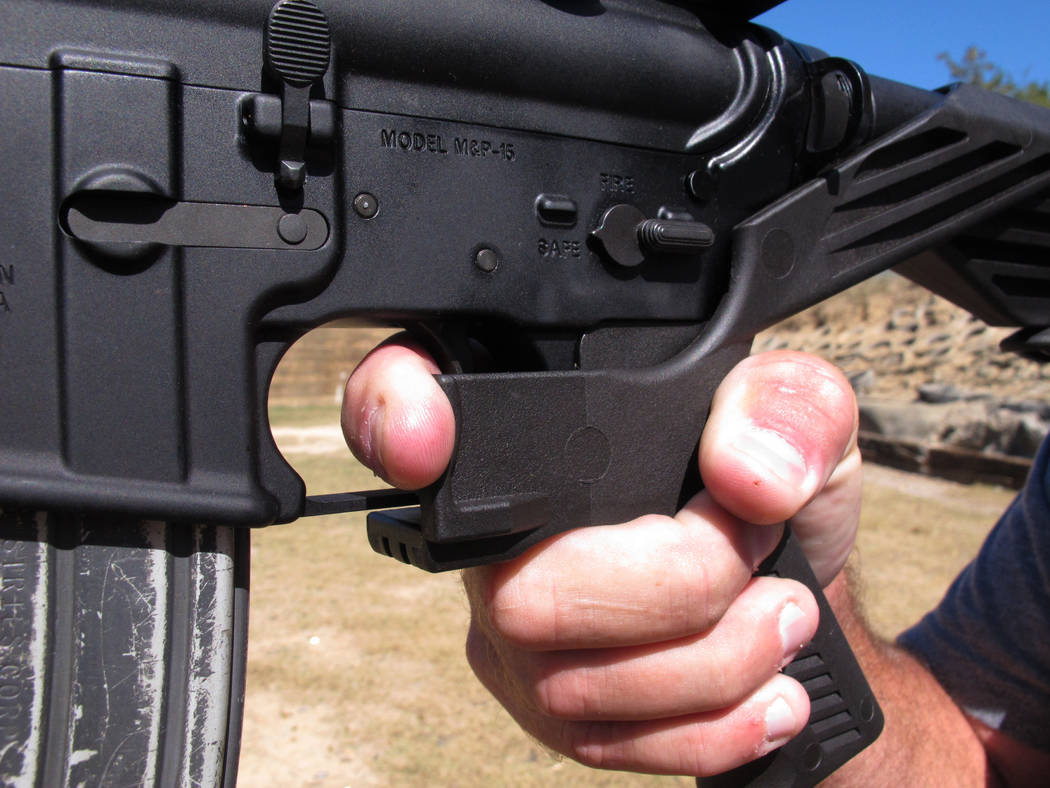Analysis: Push to ban bump stocks likely to have predictable end
WASHINGTON — After the Oct. 1 Las Vegas shooting that left 58 dead and hundreds wounded, Washington partisans launched a determined effort to find someone else to blame.
This was different from past efforts: The usual parties responded by taking positions that departed from their usual roles. Still, the outcome is likely to be par for the Washington course — nothing gets done.
The National Rifle Association blamed the Bureau of Alcohol, Tobacco and Firearms under former President Barack Obama for a 2010 decision that allowed the sale of bump stocks. The NRA even called for “additional regulations” that would limit or ban the sale of bump stocks, devices that accelerate the rate of fire.
The NRA calling for new rules against gun-related purchases? That was a first.
Gun control advocates actually argued against more regulations — another role reversal. They countered that the ATF does not have the authority to ban the devices’ sale, that only elected officials have that authority.
GOP leaders don’t need the issue, and don’t need another controversy. As it turns out, they are in a solid position to argue that ATF opened the bump-stock door, so let ATF close it. House Speaker Paul Ryan recently told reporters, “We think the regulatory fix is the smartest, quickest fix.”
Trump sticks to script
Only President Donald Trump stuck to his usual script by suggesting others hammer out the details. Asked Friday what Trump wants to do about bump stocks, press secretary Sarah Huckabee Sanders replied, “He has asked that that process be reviewed and we’re waiting on some of the details of that to take place. But a decision hasn’t been finalized on that.”
Politifact looked into the bump-stock blame game and found that ATF, in fact, did authorize the sale of bump stocks. The bureau had rejected an earlier prototype, the Akins Accelerator, in 2007, but approved a device manufactured by Slide Fire that was designed to help AR-15 enthusiasts “whose hands have limited mobility.”
Because the device did not allow a shooter to fire multiple rounds with one trigger pull, the ATF deemed it to be a “firearm part,” not a firearm itself.
According to UCLA law professor Adam Winkler, Obama’s ATF wanted to “prohibit bump stocks, but the bureau determined that the laws passed by Congress did not allow it.” After ruling against other versions with different mechanics, “ATF believed it was powerless to bar” the sale of the Slide Fire bump stock, Winkler said in an email.
If the ATF tried to reverse itself and banned the product, he added, manufacturers would have a strong case against new regulations. They could go to court and demand that the bureau follow federal gun laws and not ban bump stock sales.
George Washington University law professor Jonathan Turley also found “a strong argument” that only Congress and the president can ban bump stocks by passing clarifying legislation.
Up to Congress
That would put the ball in the court of Congress — a situation conservative elected officials usually relish.
“For those Republicans who have railed against the administrative state, this should be a no-brainer,” Turley wrote.
Some GOP pols may oppose a bump-stock ban because they don’t want to infringe on Second Amendment rights in any way. Others may be shy of efforts to ban bump stocks because experience shows that what starts as a narrow bill often widens. Gun control advocates have not shied from suggesting laws that would not have hindered the Oct. 1 shooter; they argue these restrictions potentially could prevent the next mass shooting.
Some Republicans are ready to push for a law change. Rep. Carlos Curbelo, R-Fla., wanted to prove “Congress is capable of working constructively to make America safer.” So he partnered with Rep. Seth Moulton, D-Mass., to introduce a bill to ban the sale of bump stocks. Curbelo and Moulton introduced their measure with nine GOP and Democratic co-sponsors.
GOP leaders aren’t eager to consider strict gun restrictions. Many Democrats are, but they also know that the last time Congress passed big gun bills, Republicans took control of both houses in the 1994 midterm elections.
And for what? As Turley wrote for The Hill, “even without a bump stock (gunman Stephen) Paddock could have maintained nearly the same rate of fire with rapid trigger pulls for that critical nine minutes.”
Contact Debra J. Saunders at dsaunders@reviewjournal.com or 202-662-7391. Follow @DebraJSaunders on Twitter.


















